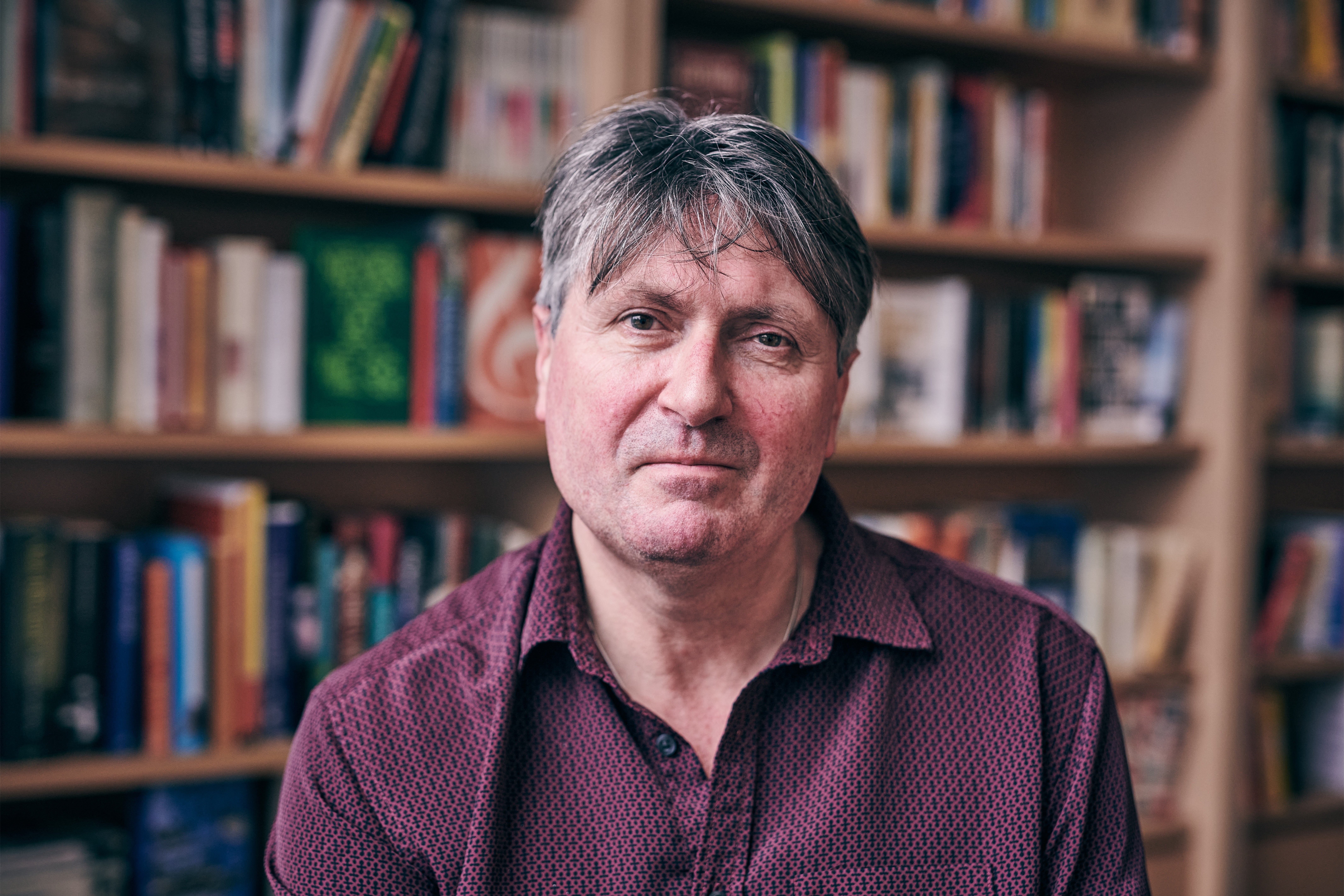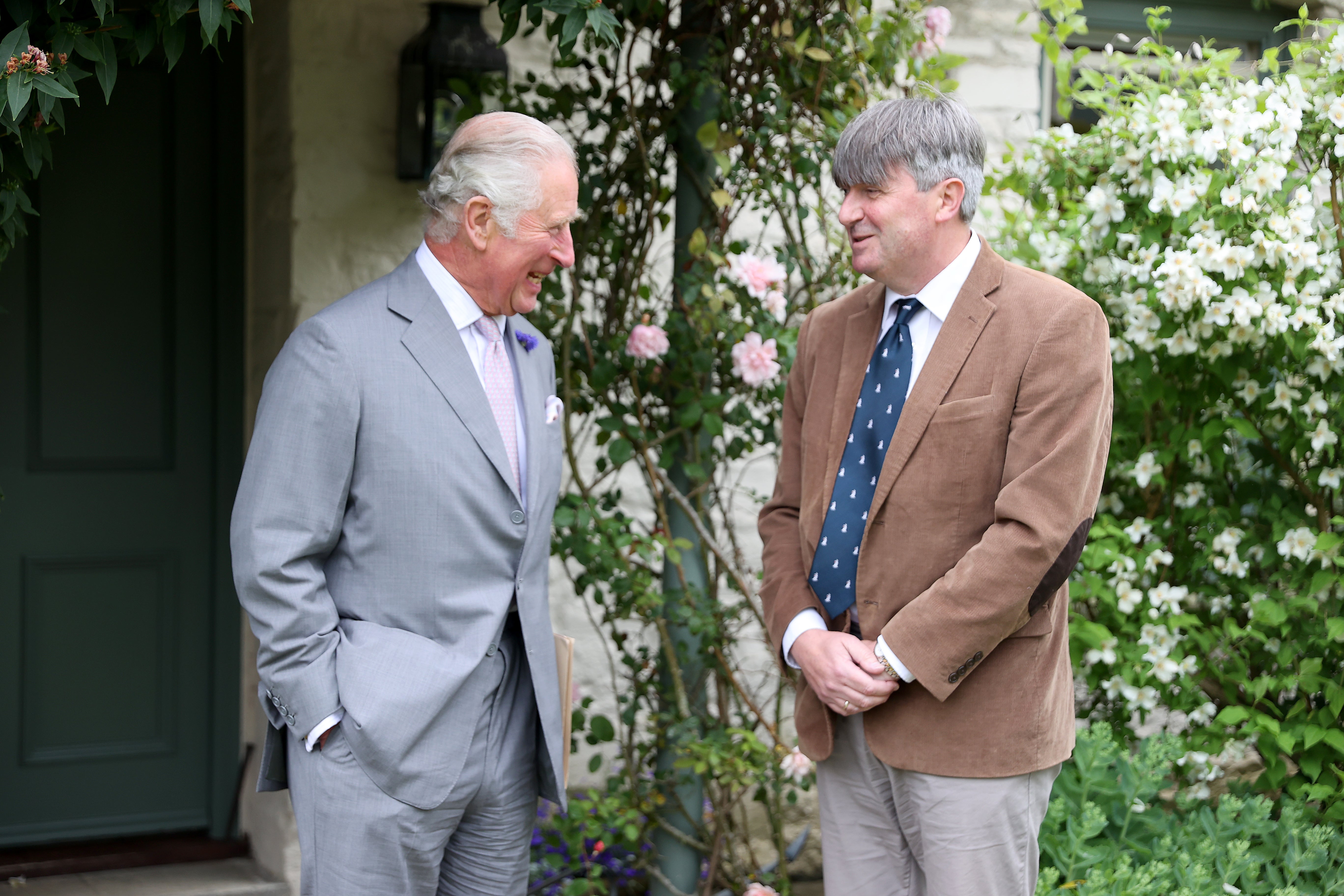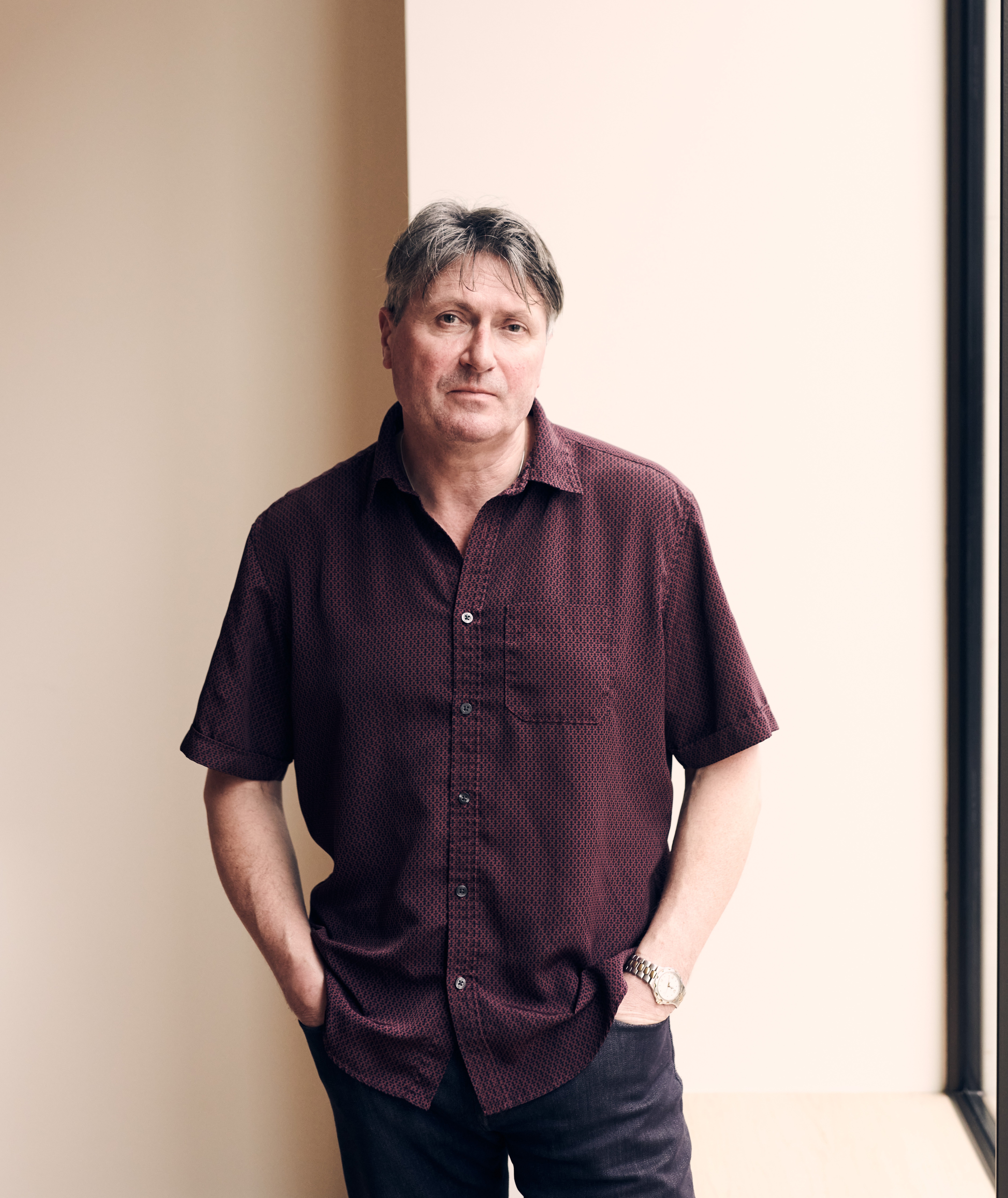Simon Armitage: ‘The nub of being poet laureate seems to be being asked what the point is of being poet laureate’
The esteemed writer speaks with Claire Allfree about the misconceptions of his royal role, why all nature poetry is now innately conservationist – and that infamous and ‘scary’ Morrissey interview

The second poem in Simon Armitage’s new poetry collection is titled “Drey” – a reference to the small hanging baskets of branches in which squirrels live. Armitage describes a drey as a “twig and leaf crow’s nest squat/ wombed with feathers and moss”. I hadn’t heard of the word before, I tell him. “It often comes up in crossword clues,” the poet laureate replies, in his unusually slow, deliberate voice. “Although if you spell it with an ‘a’, it has something to do with beer barrels: ‘A brewer’s dray.’ There’s a richness there. But I was really thinking about animal habitats, and I realised each animal home has a specific word. Almost like an address.”
That conceit is at the heart of Dwell – a playful, magical set of poems, each one devoted to a different habitat in the British landscape. There’s the usual – “Pond”, “Sett”, “Lodge” and “Web “(or “trampolines of death” as the 61-year-old puts it) – but also lesser-known abodes like “Scrape”, the home of a hare, and “Hibernaculum”, the underground shelters used by hibernating animals. Armitage imagines a hedgehog curled up like “spiky boxing gloves”. The poems are like miniature stories, combining his conversational style and startling lyrical precision with that sly narrative wit: “Deer Diary”, for instance, is an elegantly structured tease that plays on that animal’s elusive character and sense of mystery.
The poems were commissioned by the Lost Gardens of Heligan in Cornwall, where they will eventually become inscribed into the earth and foliage, in the form of installations, recordings and sculptures, “like an alternative guided tour”, as Armitage puts it. (He’ll also be reading from them later this month at the Hay Festival.) “The Gardens [which date from the 18th century and have since become Europe’s largest restoration project] are very manicured, very exotic, almost tropical,” he says. “But the animals you find there are very British. And that’s fortunate because we are losing species hand over fist. Despite the Gardens being almost foreign, they have become a refuge.”
Environmentalism has been at the heart of Armitage’s wide-roving nature poetry for years. It’s unavoidable. Yet he dislikes the idea that his poems might be seen as a form of campaigning. When I tell him Dwell put me in mind of Robert Macfarlane’s The Lost Words project, which set out to reclaim common nature words that are falling out of use among children, Armitage replies sniffily: “I didn’t want to tell children what words they should use and what they shouldn’t. I didn’t want to be didactic.”
Certainly, Dwell is often very funny: “Insect Hotel” consists of snippy Airbnb-style reviews from its various diverse residents. “Horrendous. Brought the kids with us but next morning they’d been eaten by a Dunnock. Two thumbs down.”
Armitage argues that the great pastoral tradition that has sustained English poetry for centuries has lost its innocence. Or rather, its complacency. “Poetry has definitely got its money’s worth out of nature,” he says. “Nature has been both backdrop and sentiment, and there has been the sense that it would be there for ever, always available to be exploited for all these artistic purposes. But that world doesn’t exist any more. Whenever you write about nature these days you are involved in conservation.” Even the wild, magnificent poetry of his beloved Ted Hughes was concerned with this, Armitage says. “Hughes wanted to capture the wonder of nature. Wonder can be ecstatic, and it can also be terrifying. In recreating that, he made us want to taste more of it, and to live in a world where that could exist.”
Armitage is talking to me over Zoom from his attic garret in his house in Yorkshire, where he lives with his second wife, the BBC radio producer Sue Roberts, a few miles from the village of Marsden where he grew up (the couple have a daughter, Emmeline, a national slam poet champion in her twenties). I can’t give any more details because he has blurred out the backdrop on his screen, meaning only his face is visible. “I hadn’t tidied up,” he says a bit sheepishly, although it later transpires that he is oddly oblivious to his surroundings anyway. “I’m always being told I don’t notice things, particularly in the garden.” Surely this is rather strange for a poet? “Oh, I’m a very poor looker. But I think I dwell on things instead. I’d rather encourage people to think rather than see.”
He’s been encouraging readers gently, wryly, sometimes emphatically and often beautifully throughout a career stretching more than 30 years. Armitage became poet laureate in 2019 – it’s a 10-year post, which he is just over halfway through. More than any living exemplar I know, he defies the popular image of a poet as a wan aesthete producing impenetrable verse from a lofty ivory tower. There is something hewn from the earth about him, something tangy and stubborn, solid and rooted. He talks this way too, choosing his words carefully and thoughtfully, his voice plain and flat.

He can also be the teensiest bit chippy. In his time as poet laureate, for which he is paid in sherry (a staggering 720 bottles a year), he has more than stepped up to the plate as the nation’s poetic avatar, responding not just to the big national events such as royal deaths and coronations, but to smaller, less obvious moments, too. He has just completed a set of poems that have been inscribed, in ship’s brass, into the new shore defences in Portsmouth. This has tickled him since he studied geography at Portsmouth Poly but spent his time writing poems instead. “And now I’ve got the chance to put a bit of poetry into the geography,” he says, delighted in a very dry, Simon Armitage kind of way.
Yet he is not at all keen on questions about being poet laureate. “The nub of being poet laureate seems to be being asked what the point is of being poet laureate,” he says. “It’s almost a full-time job. And royalty is like catnip for journalists. So, I’m slightly unwilling to talk about all that.”
I suspect this reluctance is at least partly because he intuits that some might regard a working-class poet from Yorkshire (if I were to guess his politics, I’d swing left) as being slightly incongruent with a job that has clear establishment connotations. He avoids political messaging in his poetry, which encompasses the tenderest of love poems and the GSCE staples “Poundland” and “Hitcher”, but his plays tend to have sharper teeth. Both his 2015 dramatisation of The Odyssey and his version of Hansel and Gretel for Shakespeare’s Globe were deeply concerned with the contemporary refugee crisis.
Being poet laureate is about writing the best poems I can
When I ask whether today’s sharply polarised cultural landscape makes his job of being poet laureate particularly challenging, he shuts down. “I don’t see it as my job to bring the nation together,” he says. And: “I refer you to my previous answer. I see it as being about writing the best poems I can.”
Fair enough. He’s certainly a terrific ambassador for the form – a trustee of the National Poetry Centre, which plans to open a national home for poetry in Leeds in 2027; a former poetry professor at Oxford and Sheffield; a current professor of poetry at Leeds; and a regular presence on TV and radio. Alongside several plays, he has produced acclaimed translations of Homeric verse and the medieval epic Sir Gawain and the Green Knight, and has published more than 20 original collections. He is also the lead singer of LYR (Land Yacht Register), which released its debut album in 2022. A year later, he published a book of song lyrics, Never Good with Horses. He is a music nut.
Incidentally, he is also known for an infamous interview he conducted with his hero Morrissey for The Guardian in 2010. During that sit-down, Morrissey made an ugly racist comment about Chinese people, which made headline news at the time. Armitage has often refused to talk about that conversation and its fallout – but now, he says: “It was quite a scary period of my life. Morrissey was a powerful and, I assume, wealthy individual and I’d reported what had happened in good faith in a way that allowed people to make up their own minds about it. And it had blown up way beyond the interview. Lawyers were all over it. It became very uncomfortable.”

Did Morrissey’s comment affect how Armitage felt about his music? “I don’t think it did. I think I had recognised Morrissey as someone who could drop bombs. I still listen to the Smiths. I don’t judge people by fractions and portions of what they have said. If Joseph Lister had turned out to be an absolute bastard, I’d still be taking antibiotics.”
Later, perhaps feeling he hasn’t answered sufficiently, he emails me to elaborate more broadly on the issue of cancel culture. “It troubles me when people are vilified for making mistakes, or worse, if they’ve been trying to do the right thing but have used the wrong language or made an error of judgement [Morrissey, who is an animal rights advocate, made his comments in the context of China’s deplorable record on animal welfare]. There are enough truly terrible people in the world without having to aim hatred at those who’ve innocently or accidentally or inadvertently strayed from the course of righteousness.
“And I don’t think we should strip away the cultural furniture of our past, no matter how unworthy it now seems. Just put a different sign on it and give it a new context, a reminder of how and why we’ve changed, and from what. We need to know what we were like.”
Lawyers were all over the Morrissey interview. It became very uncomfortable
Armitage never intended to become a professional poet. Instead, after earning an MA in social work in 1988, he followed his father into the probation service in Manchester. He left in 1994, overwhelmed by some of the horrors he had witnessed, and devoted himself full time to poetry, having already published his first collection, Zoom!, five years earlier.
For some time, Armitage regarded his new career as a clean break from what he had been doing before. Now he thinks the two things are inextricably related. “At the time I absolutely rejected the idea that I’d become some sort of social worker in verse, because when I left the service I wanted to escape its orbit. But I can see now I’ve carried on working with some of the same sensibilities and sympathies,” he says. “I’ve written a lot for marginalised people, people who’ve had their voices taken away, who are damaged or broken. And I have found some pleasure in realising writing poetry wasn’t just escapism.” Armitage agrees that, perhaps more than any other genre, poetry gives voice to the dispossessed. “That’s why it is such a humane activity, because it recognises the individual viewpoint instead of mass ones.”

What, though, does he feel about its future? AI, decreased attention spans, declining literacy rates: surely all pose an existential threat to one of the oldest art forms in the world? “One of the joys of translating medieval poetry is that it’s often anonymous [the Sir Gawain manuscript, for example, is by an unknown author]. We don’t know who wrote these pieces but it’s an incredible thrill to know they came from the soul of a human being who lived 800 years ago. AI, if it becomes good enough, will deny us that. It’s intriguing, but it’s also devastating.”
He despairs at how mobile phones are destroying the way we daydream. “People ask me where poems come from and I talk about the importance of letting your mind drift into a contemplative state, where you might collect a bit of language, a bit of a story, and from a poetry point of view, that can be the beginning of a piece of work,” he says. “But we deny ourselves that now because every time there is a lull, we get out the device and it tells us what to think. That’s very worrying for poetry because it’s the art form of concentration.”
I suggest to Armitage that we no longer know how to be bored. “Yes, and that’s a real shame, because I grew up in the 1960s and 1970s when there was absolutely nothing to do, and it led me and my mates into doing some extraordinary things.” He thinks In Praise of Boredom would make a good title for a book. “I’d certainly buy a book called that.”
‘Dwell’ (Faber & Faber) is out now. Hay Festival runs from 22 May until 1 June, where Armitage will be speaking on 31 May at 1pm
Join our commenting forum
Join thought-provoking conversations, follow other Independent readers and see their replies
Comments